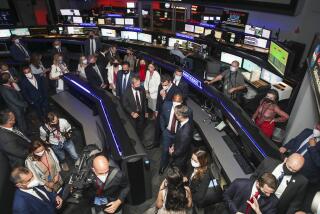Clinton to Ask $3-Billion Increase for Science
President Clinton outlined his request for a nearly $3-billion boost for science research in a crowded, invitation-only appearance Friday peppered with humorous asides about his lack of technical knowledge.
The funds, he told a Caltech audience, would fuel the countryâs economic boom and help Americans lead better--and longer--lives.
âBig ideas in science matter,â Clinton said. âOnce you make a big breakthrough, thousands and thousands of things start to happen.â
The presidentâs proposal would increase the $18-billion budget of the National Institutes of Health by $1 billion, increase the nearly $4-billion budget of the National Science Foundation by $675 million and allocate more than $1 billion for research into the emerging fields of information technology and nanotechnology.
Calling education the cornerstone of a high-tech economy, Clinton proposed increasing college tuition tax credits. The maximum would be $2,800 annually for families earning up to $120,000 per year.
Clintonâs speech was part of a series of spending proposals in recent days leading up to his last budget as president. The full budget proposal is to be revealed Feb. 7.
The increase for the National Science Foundation would include money for information technology aimed at improving supercomputers, finding better ways to archive the countryâs vast amounts of electronic data and developing intelligent machines and robots.
The other funds would help scientists in the fledgling field of nanotechnology with their almost unimaginable projects: building computers smaller than the width of a human hair and shrinking the contents of the Library of Congress into devices the size of sugar cubes.
Although such innovations may sound impossible, Clinton said they are no less surprising than the explosion of Internet interest.
Clintonâs spending proposal was praised by many in his scientifically minded audience, who said many inventions are born of basic research, not deliberate attempts to build useful products.
âIn basic science, you canât predict the outcome,â said Rudolph A. Marcus, a Caltech chemist who won the 1992 Nobel Prize in chemistry. âThatâs the beauty of it.â
The government should fund research and development because âfew companies today can afford to make investments that may not pay off for a decade or more,â Gordon E. Moore, co-founder of chip manufacturer Intel, said as he introduced Clinton.
Some younger members of the audience were more critical of Clintonâs speech. âHe didnât stress the fact that there should be more emphasis on primary and secondary education, and that is the only source of future scientists,â said Athanasios Nennes, 30, a graduate student in chemical engineering.
âHe should have said more about the environment,â added Luz Bela, a 28-year-old engineering graduate student.
Caltech employee Rita Elshout, 55, was left wondering what role older Americans would play in Clintonâs 21st century. âA lot of people my age are being replaced by technology,â she said. âWhat is the hope for us?â
Clinton, who admitted being âchallenged scientifically and technologicallyâ when he first took office, said he had come to see scientific research and its industrial spinoffs as a prime driver of the U.S. economy. To prepare for his visit to Caltech, he said, âIâve been spending a lot of time trying to get in touch with my inner nerd.â
Saying he now counts scientists such as Stephen Hawking among his friends, Clinton boasted that his increasing computer literacy allowed him to buy Christmas items online for the first time last year.
âI ordered Arkansas smoked ham and sausage delivered to my door,â he said. âI think the 21st century has more for me than I originally thought.â






